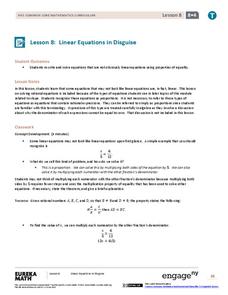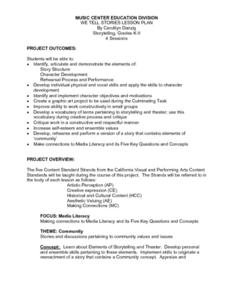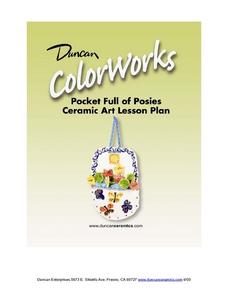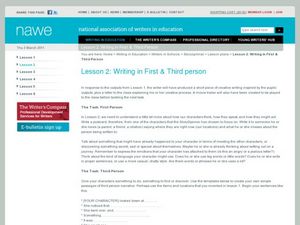National Gallery of Canada
Make a Parfleche
Examine American Indian art and culture by observing contemporary art and creating original pieces. Class members discuss artwork included in the plan and use these images to help inspire their own work, which should represent...
EngageNY
Successive Differences in Polynomials
Don't give your classes the third degree when working with polynomials! Teach them to recognize the successive differences and identify the degree of the polynomial. The lesson leads learners through a process to develop an understanding...
EngageNY
Radicals and Conjugates
Make the irrational rational again! Continuing the theme from previous lessons in the series, the lesson relates the polynomial identity difference of squares to conjugates. Learners develop the idea of a conjugate through analysis and...
EngageNY
A Focus on Square Roots
Pupils learn to solve square root equations and rationalize denominators. Problems include those with extraneous solutions.
EngageNY
Equations Involving a Variable Expression in the Denominator
0/0 doesn't equal 0! Begin this lesson by allowing the class to explore the concept of dividing by zero. The introduction allows for discovery and provides meaningful examples of dividing by zero. This understanding leads to solving...
EngageNY
Volume of Composite Solids
Take finding volume of 3-D figures to the next level. In the 22nd lesson of the series, learners find the volume of composite solids. The lesson the asks them to deconstruct the composites into familiar figures and use volume formulas.
Curated OER
Majestic Murals
Albert Bierstadt is a highly celebrated artist who was able to capture the beauty of the American landscape. The class will first learn how Bierstadt explored America during the 1800s and painted the majestic countryside. Then, they will...
Curated OER
Understanding Symmetry Through Visual Art
Have your class explore symmetry, radial balance and fractional parts in natural and man-made objects in their environment. Learners list examples and identify symmetrical and asymmetrical designs. Pupils are given a box of crayons and...
Curated OER
Moby Dick Puppetry
Such an ambitious lesson! Third graders with special needs listen to an audio recording of the novel, Moby Dick. They stop often to discuss each of the main characters and analyze their actions in the story. They then make puppets of one...
Mathematics Assessment Project
Representing Functions of Everyday Situations
Functions help make the world make more sense. Individuals model real-world situations with functions. They match a variety of contexts to different function types to finish a helpful resource.
Mathematics Assessment Project
Estimating Length Using Scientific Notation
Would you rather have a million dollars or 1 x 10^6 dollars? To find the answer to this question, class members first complete an assessment task converting numbers between decimal notation and scientific notation. They then take...
Mathematics Assessment Project
Matching Situations, Graphs and Linear Equations
What do guitars, candles, and helicopters have in common? They're all in this resource. Learners complete an assessment task to determine the amount of profit made in a guitar class based on given information regarding variable...
EngageNY
Mastering Factoring
Math class is full of drama—there are so many problems to work out! Pupils work out factoring problems. They use quadratic methods of factoring higher degree polynomials, in addition to factoring the sum and difference of two...
EngageNY
Obstacles Resolved—A Surprising Result
The greater the degree, the more solutions to find! Individuals find the real solutions from a graph and use the Fundamental Theorem of Algebra to find the remaining factors.
EngageNY
Linear Equations in Disguise
In the eighth segment of a 33-part unit, learners look at equations that do not appear to be linear at first glance. The equations are proportions where the numerators and denominators may have more than one term. To round out the...
EngageNY
Cones and Spheres
Explore methods for finding the volume of different three-dimensional figures. The 20th lesson in the 25-part series asks learners to interpret diagrams of 3-D figures and use formulas to determine volume. Scholars must use the...
Curated OER
We Tell Stories
Young readers bring characters to life by working in small groups to script and perform stories that contain a community concept. Detailed questions and activities are outlined for the class. Consider having your groups create...
Curated OER
Pocket Full of Posies: Ceramics
After studying the plant or flower life cycle, have the class create a basket of flowers out of clay. They hone their ceramics skills while they push, pull, then paint clay to look like flowers they've seen in nature. There are several...
Curated OER
Israel
The class creates and performs a movement performance of the creation story found in the Jewish tradition. This lesson begins with the research of Israeli culture and culminates in a performance of the narrated creation story....
Curated OER
My Own Backyard
Students explore and react to the painting The Road to Santa Fe. In this interacting with art instructional activity, students locate various objects in the painting. Students copy the angle of objects by using their bodies. ...
Curated OER
Writing in First and Third Person
Explore narrative writing by participating in a role-playing activity. In this perspective lesson plan, learners define first and third person in writing and discuss how it changes the mood of the reader. The first activity has pupils...
Curated OER
During Reading Strategy for Charles Dickens’ Great Expectations
Readers create a literary scrapbook for one of the characters in Charles Dickens' Great Expectations and fill it with mementoes, journal entries, letters, etc. A great way to get kids to think about characterization.
Sargent Art
Facial Proportion Challenge: Freaky Faces
Young artists have fun making freaky faces when they accept the challenge of making proportional portraits. They must find pictures in magazines, cut out two eyes, a nose, and a mouth, and then rescale these images into a portrait.
EngageNY
Mid-Unit 1 Assessment: Human Rights Vocabulary and Common Prefixes
Here is a mid-unit assessment for a group of lessons studying the Universal Declaration of Human Rights (UDHR). The first half of this instructional activity calls for several forms of review. Your class will review the content of the...

























